Carnation
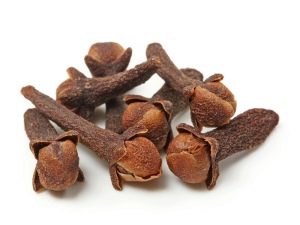
People call the clove tree Syzygium fragrant. And in Latin it sounds like Syzygium aromaticum.
Appearance
The cloves that we often use for culinary purposes are nothing but clove buds.
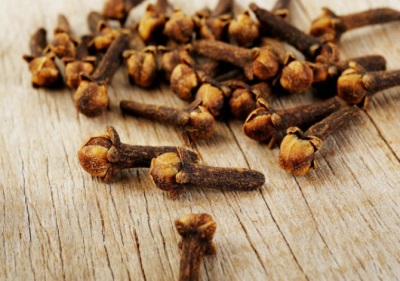
The tree itself is a plant of the tropics, belonging to the myrtle class. The bark of the clove tree is dark gray in color. A large number of branches extend from the trunk, which are covered with dense green foliage. Oval leaves in length reach a size of about 25 cm. Interestingly, the upper side of the leaf is equipped with small glands.
During the flowering period, and this is twice during the year, the ends of the branches of the clove tree are covered with inflorescences, which are formed by semi-umbrellas. Flowers are equipped with double 1.5 cm perianths. The calyx is red. Four petals of white with a pinkish sheen form a corolla, from which fluffy stamens are visible. After flowering, oblong purple berries ripen on the clove tree. Their length is 2.5 cm, and they are a little more than a centimeter wide.
The shape of a tree at a young age resembles a pyramid. With maturity, its branches begin to fall down. The height of the tree usually fluctuates around 12 m. Under favorable conditions, some representatives can grow up to 20 m. The life of a clove tree is about 100 years. The whole tree is permeated with aromatic oil: leaves, bark, flowers.
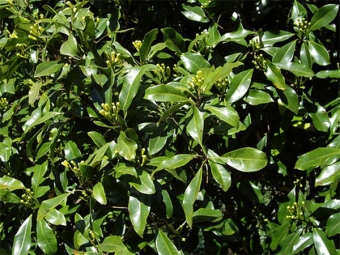

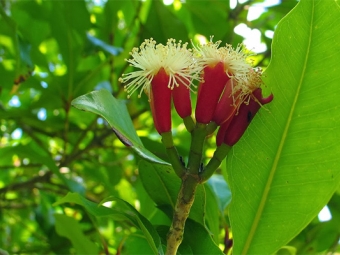
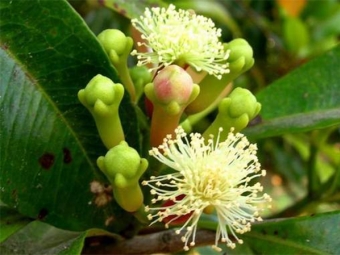
Where does it grow?
Indonesia and the Malay Archipelago are the native places of the clove tree.At the moment it grows in India, Sri Lanka, on the islands of Zanzibar and Pemba, in Tanzania. Moreover, Tanzania owns the lion's share in the production of the famous spice - 90%.

spice making method
When the inflorescences have gained strength, but have not blossomed, they are collected and dried. Flower stalks are removed. Not every tree is suitable for collection. Only those that are over 6 years old. Drying does not require any special conditions. In this dried form, they reach us. The clove tree gives a rich harvest. In general, the production costs of spices are small, which is why cloves are inexpensive.
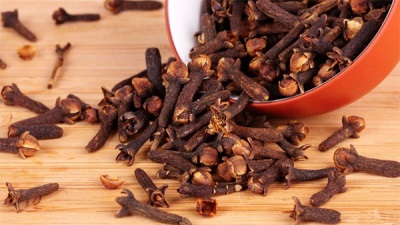
Peculiarities
Cloves are very pungent in taste. At the same time, the pungency is contained in the petiole, and the aroma is in the cap. Quality seasoning oily to the touch. Especially the petiole. If you click on it and swipe it across a piece of paper, it should leave a meaty streak.
If you need ground cloves, then it is better to grind it just before use. Purchased ground cloves are less fragrant.
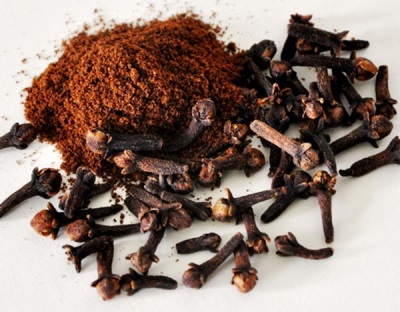
Nutritional value and calories
100 grams of dried clove buds contain 323 kcal.
In terms of nutritional value, cloves contain:
- Proteins - 6 g.
- Fats - 20 g.
- Carbohydrates - 27 g.
Chemical composition
- Essential oils (about 20%), the "lion's share" of which belongs to eugenol (85%).
- Tannins (20%).
- Dietary fiber (about 35%).
- Ash.
- Water.
- Vitamins (group B, PP, C, E, K).
- Minerals (Mg, Fe, Cu, K, Na, P, Ca, Se, Mn, Zn).
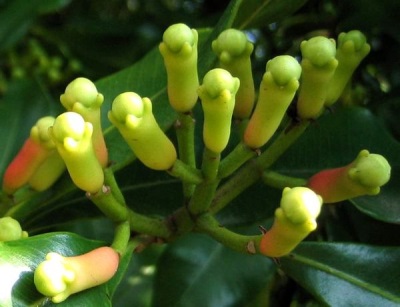
Beneficial features
Cloves have many beneficial properties that are due to the presence of eugenol in its composition:
- antiseptic;
- antispasmodic;
- antiviral (staphylococci, causative agents of dysentery);
- disinfecting;
- diuretics.
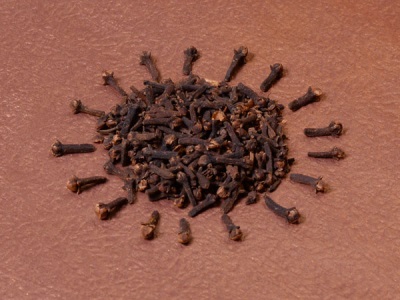
Harm
- Cloves increase the acidity of the stomach, which causes heartburn.
- It increases muscle tone - this is harmful for a pregnant woman, as it can provoke a miscarriage or damage the health of an unborn baby.
Contraindications
- Children's age (up to two years).
- Increased blood pressure.
- Pregnancy.
- The general state of overwork and the state of internal tension.
- Do not use cloves for people suffering from gastritis with high acidity of the stomach.
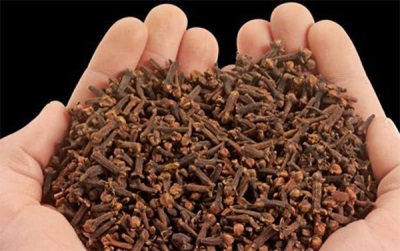
Oil
Both the flowers and the bark are used to make oil.
Clove oil is a very useful product to have at home. It's not that hard to make your own. The main ingredients are olive oil (100 ml) and clove buds (1 tablespoon). Put the composition on fire, remove after boiling. Pour the cooled oil into a convenient container and use as directed.
Properties of clove oil:
- Clove oil is a necessary remedy during cold epidemics. And if you could not avoid such an unpleasant phenomenon, clove oil would be an ideal remedy. Inhalations with its use will relieve coughing.
- For a toothache, moisten a piece of cotton wool with clove oil and place it on the aching tooth. Relief will not be long in coming.
- Clove oil is added to the base massage. This composition favorably affects the condition of the patient with arthritis and arthrosis, relieves pain and inflammatory symptoms.
- Clove oil speeds up the healing process of wounds. It is enough to make an oil lotion on the affected area of \u200b\u200bthe skin.
- Fights acne.
- Clove oil is used in aromatherapy. It perfectly relieves stress and nervous irritation.
- The cosmetics industry is indispensable without clove oil.It is added to various balms and creams, perfumed waters are flavored.
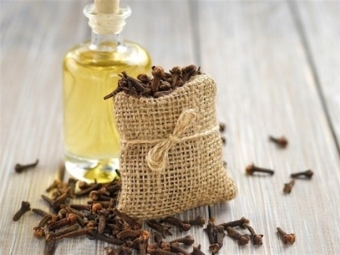
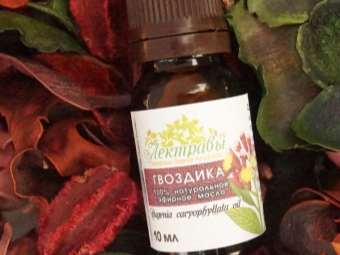
Application
In cooking
- One of the most well-known culinary uses of cloves is in marinades and pickles. It is added when preserving cucumbers and tomatoes. Cloves are one of the most important ingredients in making homemade ketchups. Another plus of this spice is the ability to enhance preservation. Try making a simple and flavorful tomato salad with cloves for the winter. Onion (half rings) and tomatoes (slices) are stacked in jars in layers. If for cooking you took a jar with a capacity of 3 liters, then put 4 bay leaves and 4 cloves on top. You can add peppercorns. Next, fill everything with marinade. The marinade is prepared from water (liter), salt (3 teaspoons) and sugar (4 tablespoons). The marinade must be boiled in advance. Pour them with tomatoes and onions and sterilize for 10 minutes. At the 8th minute, pour in 6 tbsp. tablespoons of vegetable oil and 4 tbsp. spoons of vinegar essence. Next, we roll up the hot jars with lids, turn them upside down and wrap them with a blanket until the next day.
- Confectioners in the manufacture of their masterpieces use a mix of cloves, cardamom and cinnamon. It is flavored with sweet pastries, various compotes and puddings, mousses and punches.
- Cloves pair perfectly with black pepper. This mixture gives an indescribable flavor to meat dishes (pork, lamb). It is also used in the preparation of various sauces; it will set off the tender meat of turkey and chicken.
- With the help of cloves, you can prepare a fragrant and healthy tea drink. Just throw 3 clove buds into boiling water. After 10 minutes the tea is ready. It is very important not to boil the cloves, otherwise all the useful substances, including the aroma, will evaporate, and the dish will acquire a bitter taste.
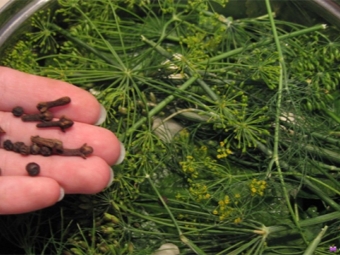

The aroma of cloves is very rich and pronounced. In this regard, the spice must be added to dishes very carefully. Otherwise, it will simply kill the taste and smell of the dish. In sauces, cloves are added in ground form, and in basic sauces - as a whole. If you need to bake a meat tenderloin, then you can simply stick a clove into a piece of meat.
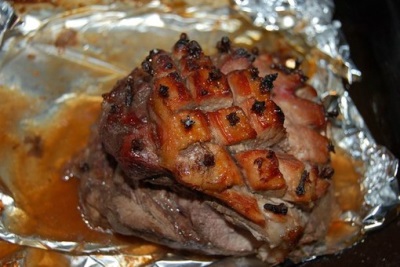
In medicine
- It is used as a remedy that normalizes blood pressure.
- It is used for the normal functioning of the organs of the gastrointestinal tract.
- Antiseptic properties have found their wide use in dentistry. If you have a toothache, just chew on a clove bud. This will not only save you from suffering, but will also give freshness to your breath like any mint chewing gum.
- Cloves are recommended to use in order to normalize the course of the menstrual cycle.
- Used to treat colds. To do this, mix a pinch of ground clove buds and a teaspoon of honey. This medicine is taken orally twice a day.
- With a dry cough, it is recommended to chew a clove. Since it causes a rather strong burning sensation, this procedure is recommended to be carried out with a lollipop candy.
- With the help of cloves, you can get rid of parasites that live in the intestines.
- Helps fight hiccups.
- Carnation is an aphrodisiac that awakens sexual desires.
- Treats diseases of the joints (arthritis, arthrosis).
- A decoction of clove buds is a remedy for eye diseases. It also relieves puffiness around the eyes.
- Cloves are a wonderful remedy that people with low blood pressure need. You can just chew on clove buds. Works like caffeine.
- Essential oils of cloves have a beneficial effect on the body of asthma patients.
- You can strengthen your heart with mulled wine. The cooking process in this case is unacceptable: you can lose all valuable substances. Therefore, you just need to add 5 clove buds and cinnamon (to taste) to the floor with a liter bottle of red wine and put it in a dark place. The infusion process lasts 21 days. You can take this medicine from 1 to 3 times during the day, drinking tea. Dosage - 1 teaspoon.
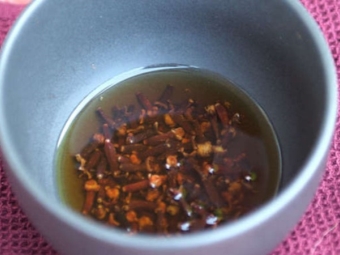
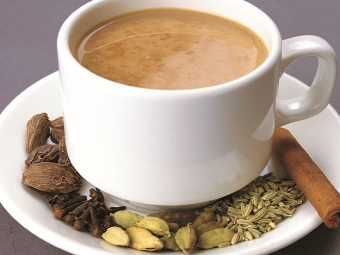
When losing weight
Since cloves are very rich in their composition of vitamin and mineral complex, it is useful and recommended for people on diets.
The benefit of cloves is that it improves the process of high-quality digestion of food. Therefore, lovers of a slender figure can be sure that the extra "fat" will not be deposited anywhere.
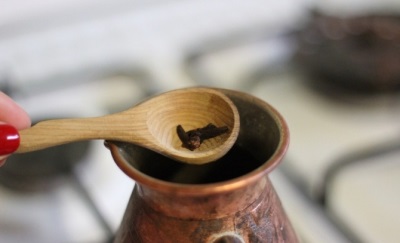
Drink delicious and fragrant tea with cloves and lemon. Moreover, anyone can cook it. To do this, cook sugar syrup from 3 teaspoons of sugar and 100 ml of water over low heat. Brew black tea (1 tablespoon for 2 cups of boiling water). Tea is infused for 5 minutes. Then it is filtered and mixed with sugar syrup, juice of half a lemon and 4 cloves. After 2-3 minutes you can enjoy the drink.
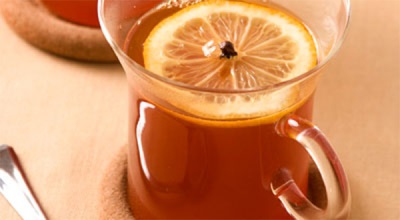
At home
The smell of cloves is not liked by blood-sucking insects. An aroma lamp using cloves will get rid of annoying mosquitoes.
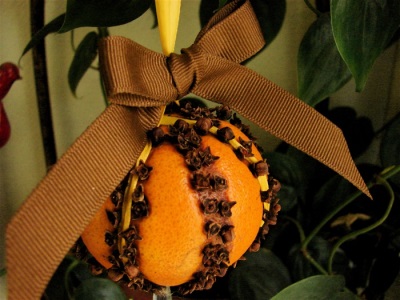
cultivation
Since the clove tree is an evergreen and heat-loving plant, it is possible to grow it only in greenhouse conditions. He needs positive air temperature from 17 ° to 25 °. The clove tree propagates by petioles, seeds, or its branch can be grafted onto another tree. Seeds are planted in a mix of sand and peat, simply scattered over the surface.From above they should be sprinkled with soil, then covered with a film and wait for shoots, which should appear after 4 weeks. When the first two leaves appear, the plants are seated. In the future, the clove tree must be cut and pinched, thus forming a crown.
If a cut petiole is used, then its cut must first be treated with root, and only then placed in a mixture of peat and perlite. Next, the petiole is covered with a film. The soil for planting should be slightly acidic. Mandatory drainage and the presence of a hole in the pot. The soil can be prepared independently. Wet peat, coarse sand, humus, leafy soil and two parts of soddy soil are mixed in one part. A pot with a tree is optimally placed near the southern windows. Too bright lighting should be avoided. The sun can burn the leaves.
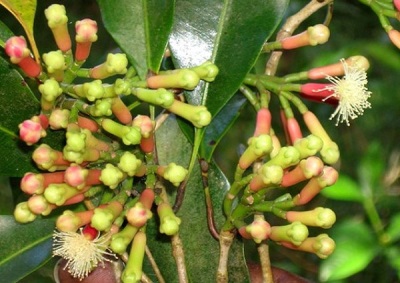
The clove tree is watered regularly. For irrigation, you need to use water that has settled. In addition, the clove tree needs spraying. In winter, watering is slightly reduced, and spraying is stopped. To feed the tree, mineral nitrogen and potassium containing fertilizers are used, which are applied to the soil in the spring and summer; it is not necessary to feed the clove tree in winter and autumn. Transplantation is carried out in the spring. The plant must be protected from drafts.
Under natural conditions, seeds are germinated in nurseries. Plants are planted at a permanent place of growth at the age of 4 and it is during the rainy season. So that the sun does not damage the tree, it is covered with a canopy or a plant is planted next to it, which would shade the seedling. In the sixth year of life, the clove tree bears its first fruits. It gives the largest harvest, starting from the age of 20.This period lasts 30 years. In general, clove is used until the age of 60.
Interesting Facts
- You can determine how high-quality spice you have purchased by throwing it into the water. The more essential oils in the bud, the heavier it is. Floating and not sinking indicates a low oil content.
- The ancient Chinese, before visiting the emperor, certainly had to chew a little clove buds. The fulfillment of this condition was an integral etiquette and tradition of those times.
- Recent studies show that cloves inhibit the growth of cancerous tumors. In the near future, scientists plan to develop a clove-based drug that will cure blood cancer.
- From cloves, French chefs came up with an original additive to soups and broths. The onion is peeled and 5 whole clove buds are stuck into it. Then such an "assembly" is lowered into a saucepan, where the dish is being prepared. The invention is called a nail-studded bulb.
- Cloves are used in magical rituals that get rid of enemies. A handful of clove buds are thrown into a deserted place against the wind. For the rite to work, you need to leave without looking back.


















I always use cloves when salting red fish: we take trout, cut it into pieces, salt them and lay them in layers, adding a few cloves each. We leave for a couple of days. Everything, this is the best recipe I have ever tried!
Yes, by the way, cloves go well with fish dishes.
Cloves are part of the "Russian triad", which kills more than 100 species of parasites and their eggs, viruses, harmful fungi and bacteria. The composition includes 6 parts of tansy, 3 parts of wormwood and 3 parts of cloves.
By nickname, you understand where this seasoning is good))) an indispensable component of this drink!